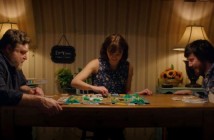
Zero Days (dir. Alex Gibney, 2016)
Zero Days
Dir. Alex Gibney
Written, directed and produced by Alex Gibney, Zero Days is a documentary about a computer malware called Stuxnet, a self-replicating “worm”, that puts the general development of a new war without rules – the cyberwar – into focus. The documentary picks up in 2010 when the maleware was first discovered. It spread around the world very fast and raised many questions. A small group of people, including cyber-detectives and journalists, tried to unravel the mysteries of that virus as it had been designed in a complex manner and with a specific target that no one had ever seen before. The origin of the malware and its target are revealed during the course of the documentary: Stuxnet had been designed by the U.S. American and Israeli government to destroy a key part of the Iranian nuclear power plant Natanz. Through that they were actually able to cause physical damage to this facility, just by one click on a computer from way out of reach. The complex virus was however not meant to spread beyond this facility, which eventually lead to its discovery in the first place. Until now, neither the U.S. American nor the Israeli government has publicly admitted their involvement nor the existence of Stuxnet as the project is still highly classified. In fact, it is so classified, that Homeland Security had no clue about the origin of the malware that it started to investigate against its own government, trying to decipher the virus and find the people to blame for it. Thanks to analysts, whistleblowers and players of the American and Israeli secret service, new discoveries of Stuxnet were made, discoveries that are highly alarming because the digital warfare is immensely dangerous due to its ability to anonymously cause chaos and destruction within seconds: infrastructure such as transportation system, power grids, water treatment plans or nuclear facilities – they can all be shut down or destroyed through cyberspace. The discovery of Stuxnet – a mission officially called „Olympic Games“ - marks a new chapter in warfare. With Zero Days, Gibney raises awareness of cyber operations, that our governments don’t want to make public or debate, obviously. It’s a very important and fascinating documentary, that is alarming, disturbing and scary at the same time, especially since there is no protocol or any government agreements for cyberwars yet and any government could easily develop and secretly use viruses to their benefit.
A Dragon Arrives! (Ejhdeha Vared Mishavad)
Dir. Mani Haghighi
After screening his second and forth features Men at Work and Modest Reception at the Forum section of Berlinale in 2006 and 2012, Iranian director Mani Haghighi returned to the festival with his fifth feature A Dragon Arrives! to have it compete in this year’s main section of the festival, the Competition. The story takes place on the remote island of Qeshm in the Persian Gulf. Here, detective Babak Hafizl (Amir Jadidi) is interrogated by the secret police after investigating a strange suicide that lead him to explore the area where the body was found at – a shipwreck in the middle of an old cemetery in a vast landscape. When a local gravedigger told him about the mysterious earthquakes that happen every time a body had been buried on that graveyard, Babak is eager to research the cause of these earthquakes once he has witnessed one himself. Unable to understand why it is only limited to the confines of the cemetery, he returns to the island with the film sound assistant Keyvan (Ehsan Goudarzi) and the geologist Behnam (Homayoun Ghanizadeh) after a brief visit in Teheran. Together these three men experience strange events and are drawn further into the mysteries of the place. A Dragon Arrives! offers an intriguing story and a clever narrative structure that blends documentary with fictionalized and dramatized “re-enactments”. The story of Babak and his friends is interrupted through a break in its narrative form as it features interviews with the director, stating his intentions behind making this film in the first place. These occasional inserts reveal his research on the topic and give some background information as the story is supposedly based on true events. Through this technique Haghighi challenges the audience and leaves the question of wether or not this is actually a true story or merely constructed to give the impression being based on true events unanswered. The film’s visuals are stunning due to the gorgeous setting in the desert landscape of Iran, highlighted by the abandoned, mysterious shipwreck and its surrounding cemetery. The sandy colors of the desert are contrasted with the bright colors of random objects used throughout the film, including Babak’s orange Chevy Impala and a number of bright colored balloons used for a photo shot within the story. Houman Behmanesh’s cinematography is a delight and makes full use of its cinema-scope aspect ratio whereas Haghighi blurrs truth and imagination, fiction and documentary and plays with the question of truth and mystery. A Dragon Arrives! is a wonderful revelation in itself.
The Commune (Kollektivet)
Dir. Thomas Vinterberg
Written and directed by Thomas Vinterberg, who has been raised in a commune himself during the 70s and 80s between the age of 7 and 19, The Commune celebrates the collective experience and the carefree spirit of the 70s with not only a lot of humor and romanticized ideals, but also with a realistic approach where personal needs and former intimacy have to come second place in an arrangement where the community comes first. When Erik (Ulrich Thomsen) inherits a villa in Copenhagen he immediately wants to sell it but his wife Anna (Trine Dyrholm) would rather move into the new place, although it is quite expensive to afford its running costs. To be able to pay them off and to escape their conventional and ordinary life, she suggests to start a commune with some of their longtime friends. Reluctant at first, Erik agrees and finds himself in a turbulent new living arrangement. The residents of the commune are shown as a carefree bunch of people, enjoying meetings, dinners and celebrating parties, deepening their friendship and love for each other in the process. While Anna is completely absorbed in her new community, Erik feels neglected by his wife. He tries to gain her attention and pursues conversations they used to have when it was just the two of them and their daughter Freja (Martha Sofie Wallstrom Hansen) but Anna is more involved in the communal activities than in the family’s intimacy. When Erik, who works as a professor of architecture, unexpectedly falls in love with Emma (Helene Reingaard Neumann), one of his students, the tone of the film switches with the second half of the film and becomes less lighthearted but more tragic and unfortunately also uneven. To live according to the ideals and principles of the commune, Erik separates from Anna and invites Emma to live with them. At first, Anna pretends to accept her new situation because she wants Erik to be able to live his life and embrace his emotions and needs. Yet she has to face the fact that he is no longer her husband and is no longer able to satisfy her needs. She has to accept his and the commune’s decision to include Emma in their lives. While Erik is happy, Anna is falling apart and suffers from a nervous breakdown, causing her to lose her job and eventually her family. She is given the choice to leave the commune and her actual family behind since the situation is not only affecting her but everyone within the community.



